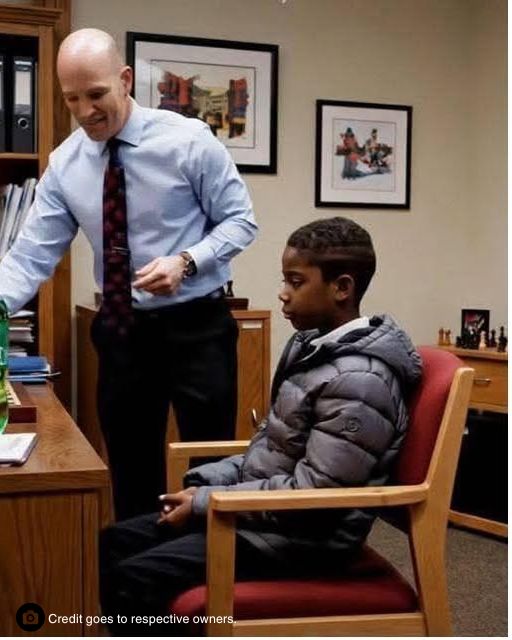The call came during second period. “One of the eighth graders is refusing to remove his cap,” the voice said, calm but with an edge.
In the office, I found Jaden, a usually respectful kid, hunched over in a chair, his cap pulled low. He muttered so quietly I almost missed it: “They laughed at me.” Slowly, he lifted his cap, revealing a terrible haircut—jagged lines and bald patches.
I knew a rule had been broken, but I also knew a child needed something more than a lecture. I grabbed my old barber kit. “Let me help, yeah?” I asked. He nodded, and as I started to clean up the messy cut, he began to talk, telling me how the laughter had followed him all the way home.
As I worked, I noticed something else on his head: tiny, raised scars. When I asked about them, he hesitated, then whispered, “That’s where they hit me. Last year. When we were still at our old place.”
My blood ran cold. He explained that the “they” was his mom’s ex-boyfriend, who would get angry and throw things. He then confessed the man had found them again last night and was let inside. The botched haircut wasn’t from a friend; it was a cruel and clumsy attempt by the ex-boyfriend to mark his control.
I put the clippers down. My job was no longer about a haircut. It was about saving a family.
“You’re not going home on that bus today,” I said, my voice firm. “You’re staying right here with me. We’re going to call your mom and some people who can help, people who make sure men like that go away and never come back. Do you understand?” He just nodded, a profound sense of relief washing over him.
My office became a command center. I called Child Protective Services and the police. When Jaden’s mom arrived, a police officer and social worker were with her. They had a plan: an emergency protective order and a new, secure place to stay.
As Jaden was leaving, his hair was now a perfect, clean fade, but more importantly, the fear in his eyes had been replaced with relief.
“Thank you,” he whispered.
“You’re a good kid, Jaden,” I replied, my voice thick with emotion. “You deserve to feel safe.”
He touched the back of his head, where the scars were now hidden by the clean lines. “You know,” he said with a small smile, “You’re a pretty good barber.”
“I’m a better principal,” I answered with a smile of my own.
That day, I broke a school rule, but I followed a much more important one. I listened. I saw a child in need, and instead of punishing him for a hat, I asked him why he needed it. Sometimes, what a kid needs most isn’t a lesson, but a safe harbor.
Credit goes to respective owners.
